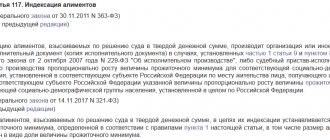What rights does each parent have after a divorce?
According to the law (Article No. 66 of the RF IC), both father and mother have equal rights in their desire to take part in raising a child after divorce. If one of the parents changes their place of residence, this should not become an obstacle to meetings and communication. Neither the father nor the mother has the right to prevent minor children from communicating with one of them, unless there are compelling reasons for this - harm to the psychological or physical condition of the minor.
The schedule of meetings between one of the parents and the child after a divorce may be determined by a written settlement agreement. The decision regarding communication between mom or dad and the child can be determined by the court at the request of one of them. If the terms of the written agreement are violated, then, if there is evidence, the person who ignored the jointly drawn up agreement bears legal responsibility.
Consequences of satisfying a claim to determine the order of communication with children
If a minor has self-care skills, the father, who agrees to take care of the child, is allowed to spend more time with him. In such circumstances, the guardianship and trial judges allow the child's father to take the minor away on weekends at a specific time, such as every second week of the month. The rest of the time, a father who has expressed a desire to take care of a minor child is allowed to meet with him on weekdays and take a joint vacation once for a year or more. Similarly, the order of communication between a child and a parent provides for the possibility of unlimited communication through existing means of communication.
As a rule, in the case of the order of communication between a child and a parent, the final verdict is of a purely individual nature. However, if the standard procedure for communication between a child and a parent does not infringe or violate the rights of a minor, then the court’s verdict on the claims contains the above possibilities, despite the presence or absence of objections from the other parent.
Who should a child live with after divorce proceedings?
In Russia, most often (80% of cases) minor children, after their parents separate, remain to live with their mother. It so happened that many are convinced that women have greater responsibility in raising children than men. In rare cases, by mutual consent, minors remain in the care of their fathers.
There may also be specific circumstances that contribute to the decision for the child to live with the father:
- maternal alcohol or drug addiction;
- mother's incapacity;
- mental disorders in women.
Co-parenting helps maintain a child's close relationship with both parents. The quality of the relationship between spouses after divorce can greatly affect the mental and emotional well-being of children. The correct behavior of mom and dad after a divorce will help reduce anxiety in the student and help avoid depression. Mature and responsible parents will always act in the best interests of the child and put their children's needs above their own.
The schedule of meetings with the child during a divorce can be agreed upon at the beginning of the divorce process. This way, the pupil will have the opportunity to communicate with both parents equally, and during this difficult period for everyone, the child’s psyche will suffer less.
Son on schedule
So, in the city of Yekaterinburg, the district court heard a case brought by a man against his ex-wife. The plaintiff asked the court to oblige the defendant “not to interfere” with him in communicating with his son and to determine the procedure for this very communication. The court respected the request and outlined on several pages the “procedure for exercising parental rights” for 13 years in advance. That is, until the child reaches adulthood. And the graph looked like this:
» From 18.00 on December 31 to 21.00 on January 2, 2014, 2021, 2021, 2021, 2022, 2024, 2026 in any territory of the Sverdlovsk region. And at the same hours, but from January 3 to January 5 in 2015, 2021, and so on until 2026 inclusive.” In the same vein, several more pages of the court decision are detailed, indicating the hours, minutes and dates of visits for years to come.
The boy’s mother went to the Supreme Court and asked to cancel these decisions, since, in her opinion, such a schedule turns the child’s life into a nightmare. The baby, the woman assured, was forced to fulfill his decision to turn into an eternal wanderer and live according to the principle of two days in one house, two days in another.
The Judicial Collegium for Civil Cases of the Supreme Court re-read the schedule of visits and visits by the child to his father and... agreed with the mother. She overturned the verdict of the Yekaterinburg judges and explained why she did it. Judging by court materials, the family appeared in 2007 and existed until 2011. The boy was born in 2009. During the divorce, the district court decided that the child would live with his mother. A separate court decision stipulates when he will meet with his grandparents.
The Supreme Court responded to this decision - they were made in violation of the law and cannot be agreed with. And that's why. There is a Convention on the Rights of the Child. In Russia it came into force in 1990. It says the following: parents are responsible for the upbringing and development of the child. And the best interests of the child are their primary concern. Our Family Code states that parental rights cannot be exercised in conflict with the interests of the children. And the interests of children are the main concern of parents. The same Family Code states that the parent with whom the child lives should not interfere with the other parent’s communication with the child. From this, the Supreme Court concludes that when considering such cases, the court must maintain a balance between the interests of the children and the rights of the parents to raise these children. Because “communication with parents in conflicting relationships” can have negative consequences for a child.
The court, according to the Supreme Court, is obliged to take into account a lot of nuances: the child’s attitude towards each parent, his physical and mental state, and the same state of the parents. This is required by law. But the local court did not establish these circumstances in violation of the law. Moreover, judging by the court materials, conflictual relations developed between the parents. And the baby himself is registered with a neurologist and “psychotraumatic situations” are contraindicated for him. The district court wrote in its decision that the procedure and frequency of communication proposed by the father does not violate the interests of the child. But on what basis the court made this conclusion is unclear. The boy's mother in the district court asked for a psychological and psychiatric examination to be ordered when the question came up about whether the father could raise the child without creating traumatic situations for him. The court refused to provide the woman with an examination, saying that it had just begun to consider the case and would investigate this issue later. But the decision on the father’s claim was made on the same day.
From all that has been said, the Supreme Court concludes that the district court has abdicated its direct responsibility for collecting evidence. And without this, a legal decision cannot be made. The court did not assess the fact that with the communication schedule that the father asked for, plus the communication schedule with his grandparents, the boy would spend 14 days a month in a family that had an extremely conflictual attitude towards his mother. With whom he actually lives. The Judicial Collegium for Civil Cases stated that these are significant circumstances that could negatively affect the child. But the district court did not examine them.
There is Article 57 of the Family Code. It says that a child has the right to express his opinion when resolving such issues. And when he turns 10 years old, taking into account his opinion becomes mandatory. And the district court did not take this provision of the law into account when it described the boy’s communication with his parent both when he turns ten years old and when he is older. The Supreme Court referred to the decision of its Plenum (N10 of May 27, 1998) specifically on the issue of communication between a child and divorced parents. It says that such abuse of parental rights to the detriment of the interests of children. The district court did not hear or verify the mother’s arguments that the father was using his parental rights to the detriment of the child’s interests.
“When making the decision, the principle of enforceability of a judicial act was also violated,” the Supreme Court said. The fact is that the local court did not find out how the parties could enforce the decision.
So all court decisions in the case have been cancelled. And it will be reviewed taking into account what the Supreme Court said.
Mistakes of co-parenting
One of the parents is always offended by the other. Sometimes the hostility is mutual. However, children should not suffer from this.
The most common co-parenting mistakes:
- Obstruction of communication.
- Insulting a parent in front of their children. You shouldn’t talk to other people about your ex-spouse from a bad perspective in the presence of a child.
- Clarification of relations with a former spouse (wife) in front of children.
- Using your child as a way to get back to your ex(s).
- Inability to compromise when it comes to changes in the children's communication schedule with the parent.
- Replacing communication with buying toys and other things.
- Using a child as a courier or to ask your ex-husband or wife for something.
- Forcing a minor to take his side.
Settlement agreement and agreement for children - what is the difference?
Any agreement regarding the upbringing of children is often called a settlement agreement. From a layman’s point of view, everything is clear - the parties make peace and agree on paper about mutual rights and obligations.
However, a nuance is important here: a settlement agreement is a consequence of resolving a legal dispute; it is concluded in court and approved by the court. Such as, for example, a settlement agreement to determine the child’s place of residence.
All other agreements reached and sealed by parents on paper cannot, from a legal point of view, be called a settlement agreement.
A voluntary agreement on children is drawn up without the participation of judicial authorities and is subject to notarization.
The procedure for meetings with children by mutual consent
Parents must establish basic rules for communication with the child (convenient visiting times, meeting places, presence of strangers, etc.), satisfying both parties, which can be realistically fully implemented. A parent living separately has the right:
- regularly communicate with the child for an unlimited time;
- take an active part in the life of a child or teenager (attend events, competitions, concerts, etc.);
- receive information about the minor’s health status, successes, failures at any time;
- express your opinion on any issue concerning the child;
- have the right to take a minor out of the Russian Federation.
It is not difficult to create and follow a schedule for the father to visit a child after a divorce, the main thing is that it corresponds to the interests of the pupil. Therefore, it is better to avoid verbal agreements between mother and father. The best solution is to create a formal written agreement. Such a document will become valid when it is registered by a notary.
The schedule and order of communication with a child after a divorce causes the most disagreement; a sample of its preparation can be seen below. It will help avoid conflicts between ex-spouses.
Sample
Settlement agreement on the procedure for communicating with a child
February 10, 2021, Moscow
Father: Ermakov Sergey Ivanovich, born July 23, 1983, resident: Moscow, st. Znamenka 18/8, passport NM 11111, on one side;
Child's opinion about communication with father
The child has the right to express his opinion about the relationship with his father and the order in which communication with him should take place. However, until the child is ten years old, the court is not obliged to take into account his opinion. After a conversation with the child, the guardianship and trusteeship authority only records his position in the examination report. The child is not questioned during the meeting.
Children over ten years of age are invited to court. Their opinion is necessarily taken into account when making a decision. However, Article 57 of the Family Code of the Russian Federation contains a clause: except in cases where this is contrary to the interests of the children.
Cases about determining the order of communication with children are highly emotional. If the parties participate in court hearings without representatives, the intensity of passions reaches such a level that the court strives to complete the process as quickly as possible. In this case, the court follows the easiest path: it accepts the position of the guardianship authorities.
However, such an approach may be contrary to the interests of the child. Without understanding the complex relationship between parents and child, the court makes a hasty decision that is harmful to the child.
I have been providing support to this category of disputes for many years. From my own experience I know how important it is to build a competent legal defense. A child contact lawsuit is a dispute about the future of your children. There shouldn't be any mistakes here.
Reasons for determining the most favorable order of interaction between children and parents
The mother or father, who is actively involved in determining the procedures for communication during and after a divorce, should have a living space where the minor can stay during the time allocated for communication. The reasons for using this premises do not matter. Thus, a parent can have premises as an owner, under a contract of free use, as a relative of the owner, and so on.
When claiming communication, a parent after divorce must create sufficient conditions for rest, play and education of the minor. The room must have a separate sleeping area, there must be toys and educational materials, and high-quality food. The exact requirements in this case with determining the order of communication depend on the age and other data about the young child.
The court requires the provision of irrefutable evidence of the absence of violations or infringements of the rights of a young son or daughter when communicating with a parent. To do this, specialists from the Moscow Municipal College of Lawyers recommend that clients after divorces receive a positive reference from their place of work or residence. Similarly, it is possible to provide evidence of the absence of negative features. As part of collecting documents, our lawyers request certificates of no criminal record and administrative offenses, obtain witness statements, and so on. Such documents presented by the plaintiff or defendant are carefully studied by the court or guardianship when making decisions on the dispute.
One of the important conditions in connection with the parent’s interest in the child and communication with him is the presence of a source of constant income. First of all, taking this factor into account when making decisions in court is determined by the fact that employment and financial security characterize the applicant positively. In addition, a stable income is necessary to support a son or daughter during their stay with the parent. From the point of view of judicial decisions, this is an important requirement.








